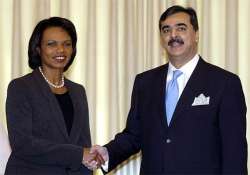Either You Are Lying Or Your People Are Lying To You, Condoleeza Told Gilani
Islamabad, Dec 16 : Former US Secretary of State Condoleeza Rice's revelations about her conversation with Prime Minister Yousuf Raza Gilani in the aftermath of the 2008 Mumbai attacks have been taken “out of context”

Islamabad, Dec 16 : Former US Secretary of State Condoleeza Rice's revelations about her conversation with Prime Minister Yousuf Raza Gilani in the aftermath of the 2008 Mumbai attacks have been taken “out of context” as she had conceded that Pakistani state was not involved in the incident, a spokesman said today.
Reacting to a front page report in The News daily today that had quoted Rice's remark to Gilani that “either you're lying to me or your people are lying to you”, a spokesman for the Prime Minister's House described the report as being “out of context”.
Rice had “conceded herself that the state of Pakistan was not involved in the gruesome Mumbai incident”, the spokesman said.
Both the President and Prime Minister of Pakistan had condemned the Mumbai attacks and “conveyed their condolences to the people and government of India over the loss of precious lives”.
“Terrorists were the enemies of not only Pakistan and India but also of the entire world. They deserved to be condemned and defeated,” the spokesman said. The report was based on excerpts from Rice's recent memoir “No Higher Honor”.
During a meeting held after the attacks in Mumbai in November 2008, Gilani told rice that the terrorists who carried out the attacks had nothing to do with Pakistan. In her memoir, Rice wrote: “Mr Prime Minister, I said, either you're lying to me or your people are lying to you. I then went on to tell him what we - the US - knew about the origins of the attack.”
When Rice arrived in Islamabad, the Pakistani leadership was still denying what the world knew by then - that the attackers were from Pakistan.
“The Pakistanis were at once terrified and in the same breath dismissive of the Indian claims. President (Asif Ali) Zardari emphasised his desire to avoid war but couldn't bring himself to acknowledge Pakistan's likely role in the attacks,” Rice wrote.
However, Rice also acknowledged that army chief Gen Ashfaq Pervez Kayani “was the one person who, even if he could not admit responsibility, understood that Pakistan would have to give an accounting of what had happened.” Rice's recollections in her memoir about the Mumbai attacks had been reported by the Indian media nearly two months ago.
However, the Pakistani Prime Minister's House had offered no clarification at the time.A total of 166 people, including six Americans, were killed in the attacks blamed on the Pakistan-based Lashkar-e-Taiba.